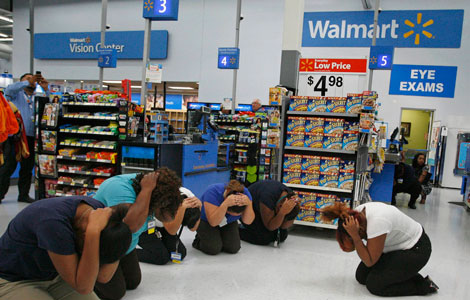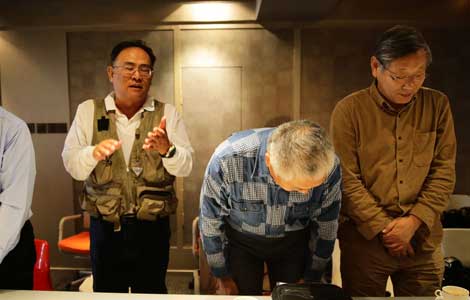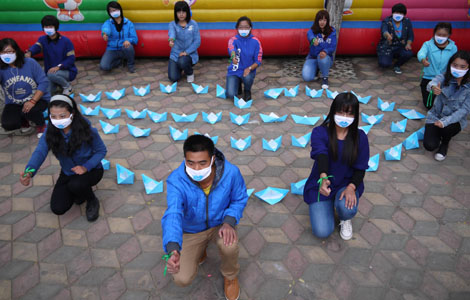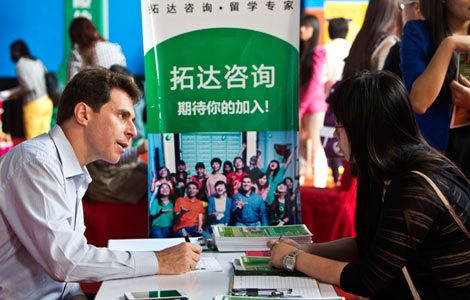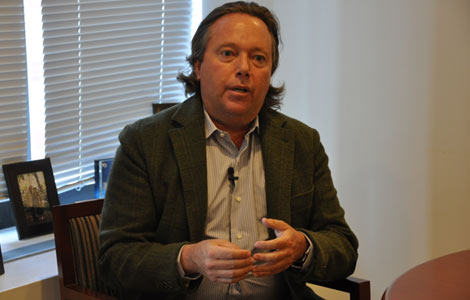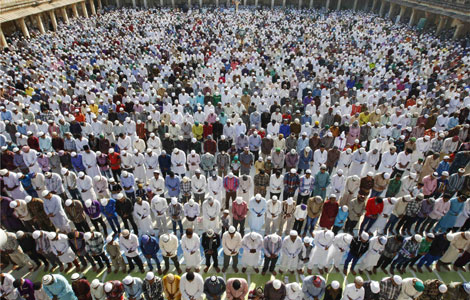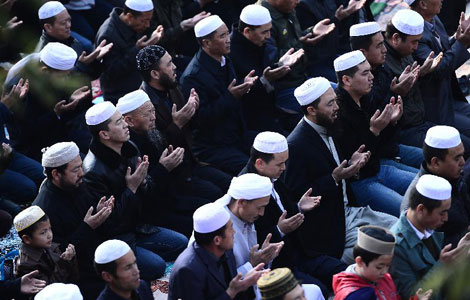Beijing criticizes Abe's shrine offering
Updated: 2013-10-18 01:24
By ZHANG YUNBI (China Daily)
|
||||||||
China again urged Japan on Thursday to respect the feelings of Chinese people after Japan's leader made his third ritual offering to the war-linked Yasukuni Shrine since he returned to office in December.
On Thursday morning, Japanese Prime Minister Shinzo Abe made an offering to the Yasukuni Shrine, where Japanese war dead are honored, including 14 Class-A war criminals from World War II, Japan's Kyodo News Agency reported.
On Aug 15, the 68th anniversary of Japan's surrender in the war, Abe provided a ritual offering to the shrine without paying a visit.
This time, Abe again did not visit in person to "avoid angering Asian victims of Japan's war-time aggression", Reuters said.
Zhou Yongsheng, a professor of Japanese studies at China Foreign Affairs University, said Abe has repeatedly called for bilateral meetings with his Chinese counterpart to improve strained diplomatic ties, but Abe's comments are "empty phrases".
Isao Iijima, an adviser to Abe, said on Oct 7 that he would push for Abe to pay a pilgrimage to the shrine this month.
Japan's Asian neighbors see the shrine as a symbol of Japan's past militarism.
According to local reports, Japanese Internal Affairs Minister Yoshitaka Shindo and Chairman of the National Public Safety Commission Keiji Furuya will visit the shrine, which they had visited during the summer festival on Aug 15.
The Chinese Foreign Ministry on Thursday demanded Tokyo "properly handle" the issue.
China "once again urges Japan to sincerely face up to its history of aggression and seriously reflect on it, and respect the feelings of peoples from victimized Asian countries, including China", Foreign Ministry spokeswoman Hua Chunying told reporters in Beijing.
Yang Tianshi, a senior expert on wartime history at the Chinese Academy of Social Sciences, said Japan's resurgent right-wing forces are behind the rush of Japanese lawmakers to visit the shrine. "The ruling of the International Military Tribunal for the Far East has not completely eradicated the right-wing forces and the radical sentiments within Japan. As a result, we have seen a growing number of Japanese lawmakers rushing to the shrine," Yang said.
Meanwhile, Seoul expressed "deep regret" on Thursday over Abe's decision, Yonhap News Agency reported.
"Our government cannot help but express deep concerns and regret over Prime Minister Abe's offering to the Yasukuni Shrine that glorifies its past wars of aggression and honors war criminals," South Korean Foreign Minister Spokesman Cho Tai-young said.
"I once again call on Japanese politicians to try to build up trust from the international community on the basis of humble reflection on its history," Cho added. Tokyo has witnessed diplomatic deadlocks since last year with both Beijing and Seoul due to its controversial gestures related to historical issues and territorial disputes.
But radical political figures in Japan continue to make pilgrimages, sometimes in groups, to the shrine during the shrine's three festivals each year.
Yang Dongliang, an expert on Japanese studies and head of the College of History at Nankai University in Tianjin, said the shrine visits were made with "deliberate ignorance of China's reactions".
"The move partly stems from a prevailing mentality within Japan that Japan was defeated by the United States and not China", Yang said.
Chinese Ambassador to the US Cui Tiankai sternly criticized that mentality on Oct 8 in Washington.
He told reporters that it was wrong "to think that Japan was defeated only by the US during World War II. Japan was also defeated by peace-loving people in Asia".
Most Viewed
Editor's Picks
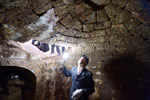
|
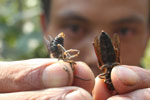
|

|

|

|

|
Today's Top News
US not budging on its arms restrictions on China
China's GDP rises 7.8% in Q3
China warns of emerging markets' slowing demand
Roche boosted by strong drug sales in US, China
IBM's China-driven slump sparks executive shakeup
Can cranberries catch on in China?
Asia-Pacific pays executives world's highest salaries
Trending news across China
US Weekly

|

|
